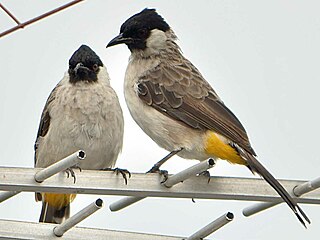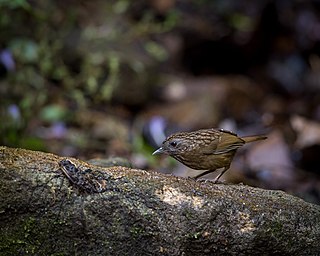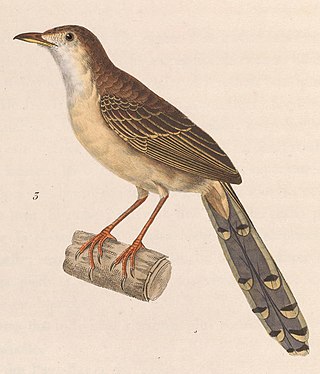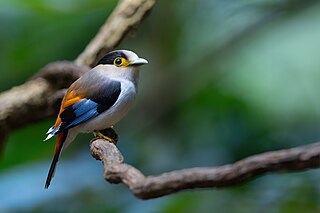
The long-tailed broadbill is a species of bird that is found in the Himalayas, extending east through Northeastern India to Southeast Asia. It is the only bird in the genus Psarisomus. The long-tailed broadbill is about 25 cm (10 inches) in length and weighs between 50 and 60 grams. It can be identified by its shrill call.

The silver pheasant is a species of pheasant found in forests, mainly in mountains, of mainland Southeast Asia and eastern and southern China. It is introduced on Victoria Island in Nahuel Huapi Lake, Neuquén, Argentina and on Vancouver Island, Canada. The male is black and white, while the female is mainly brown. Both sexes have a bare red face and red legs. It is common in aviculture, and overall also remains common in the wild, but some of its subspecies are rare and threatened.

The golden-throated barbet is an Asian barbet native to Southeast Asia, where it inhabits foremost forests between 900 and 2,700 m altitude. It is listed as Least Concern on the IUCN Red List because of its wide distribution and stable population.

The chestnut-headed tesia is a small insectivorous songbird formerly of the "Old World warbler" family but nowadays placed in the bush warbler family (Cettiidae).

The ashy bulbul is a species of songbird in the bulbul family, Pycnonotidae. It is found on the Indian subcontinent and in Southeast Asia. Its natural habitats are subtropical or tropical moist lowland forest and subtropical or tropical moist montane forest.

The sooty-headed bulbul is a species of songbird in the Bulbul family, Pycnonotidae. It is found in south-eastern Asia. Its natural habitat is subtropical or tropical moist lowland forests.

The pin-tailed green pigeon or pin-tailed pigeon is a species of bird in the family Columbidae native to Southeast Asia.

The lesser racket-tailed drongo is a species of bird in the family Dicruridae. It is found in the Indian Subcontinent and Southeast Asia.

The snowy-browed flycatcher is a species of bird in the Old World flycatcher family Muscicapidae.

The blue-winged minla, also known as the blue-winged siva, is a species of bird in the family Leiothrichidae.

The streaked wren-babbler is a species of bird in the family Pellorneidae. It is found in Bangladesh, Cambodia, China, India, Laos, Malaysia, Myanmar, Thailand and Vietnam. Its natural habitats are subtropical or tropical moist lowland forest and subtropical or tropical moist montane forest.

The blue pitta is a species of bird in the family Pittidae found in the northeastern Indian subcontinent, southern China, and Indochina. It typically lives in moist forests but can also inhabit dry forest. It is an unobtrusive, solitary bird which feeds by foraging on the ground for insects and other small invertebrates.

The bar-bellied pitta is a species of bird in the family Pittidae. It is found in Cambodia, Laos, Thailand, and Vietnam. Its natural habitat is seasonal tropical forest.

The blue-winged pitta is a passerine bird in the family Pittidae. It forms a superspecies with three other pittas, the Indian pitta, the fairy pitta and the mangrove pitta. A colourful bird, it has a black head with a buff stripe above the eye, a white collar, greenish upper parts, blue wings, buff underparts and a reddish vent area. Its range extends from India to Malaysia, Indonesia, southern China and the Philippines. Its habitat is moist woodland, parks and gardens and it avoids dense forest. It feeds mainly on insects and worms. It breeds in the spring, building an untidy spherical nest on the ground, often near water and between tree roots. A clutch of about five eggs is laid and incubated by both parents, hatching after about sixteen days.

The blue-naped pitta is a species of bird in the family Pittidae.

The rusty-naped pitta is a species of bird in the family Pittidae.

The brown prinia is a species of bird in the family Cisticolidae. The Burmese prinia and the Annam prinia were formerly lumped with this species.

The rufescent prinia is a species of bird in the family Cisticolidae. It is found in Southeast Asia, the Indian subcontinent and southern Yunnan. Its natural habitat is subtropical or tropical dry forest.

The silver-breasted broadbill is a species of bird in the broadbill family, Eurylaimidae that is found in parts of Southeast Asia. There are seven currently recognised subspecies; the other species in the genus Serilophus, the grey-lored broadbill, was also previously treated as being a subspecies of this species.

The speckled piculet is a species of bird in the family Picidae. It is found in Indian, China and Southeast Asia.





















